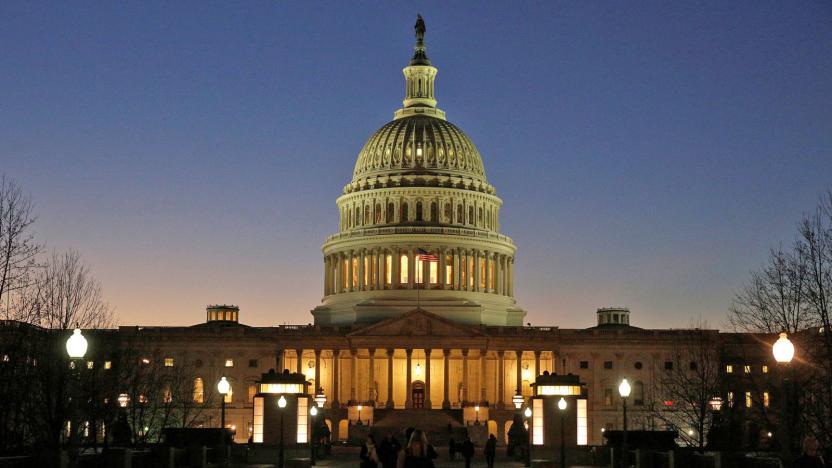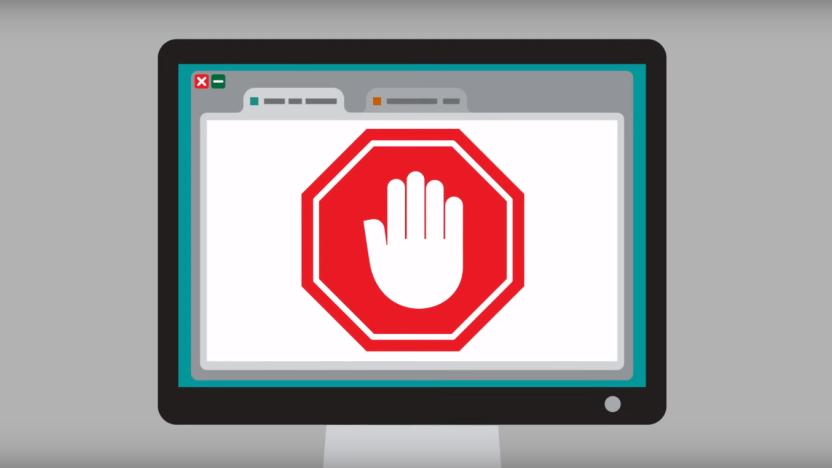InternetPrivacy
Latest

GOP rep. on ISP privacy rules: 'Nobody's got to use the internet'
The internet is a ubiquitous part of our daily lives. It's where many of us turn when we need to file our taxes, apply for jobs or search for housing. But one Republican lawmaker who voted to roll back FCC privacy regulations last month said, "Nobody's got to use the internet" when asked about his decision at a town hall meeting, displaying a staggering amount of ignorance about how the internet affects the modern world.

Democrats aren't backing down on internet data privacy
It's only been a few days since President Trump signed the bill rolling back rules that kept consumer data private from internet service providers, but it looks like Democrats aren't letting this one go yet. A few days ago, Congresswoman Jacky Rosen (D-NV) introduced a bill that would essentially roll back the one signed this week and reinstate all the consumer protections that were set to go into effect. Of course, both the Senate and House of Representatives just voted to do away with those protections, so this bill is likely going to serve more as a symbolic gesture rather than a piece of legislation that'll actually make a difference to US citizens.

EFF: Verizon will install spyware on all its Android phones (update)
Who'd have thought that just days after the house rolled back privacy protections for internet users, ISPs would take advantage? The EFF did, pointing out that Verizon has already announced that it will install spyware, in the form of the launcher AppFlash, across its users' Android devices in the coming weeks. AppFlash, as TechCrunch reports, will embed itself to the left of your home screen, offering details on local restaurants, movies or apps that you can download.

FCC head puts the brakes on new ISP privacy rules
In the latest chip at net neutrality, Federal Communications Commission has Chairman Ajit Pai has moved to put a halt to a set of privacy rules designed to shield customers' personal data from internet service providers.

Tor plans to launch a bug bounty program
Tor will open itself to attack in 2016 with the start of a bug bounty program aimed at identifying weaknesses in its security systems, Motherboard reports. Tor is a free service that allows users to browse the internet anonymously, and it's working with sponsor Open Technology Fund and bug bounty coordinator HackerOne to pull off this latest security sweep. The bug-hunting will be invite-only at first, Tor Browser Lead Developer Mike Perry told Motherboard.

Google plays privacy catch-up, adds Do Not Track option to Chrome
Google's had one foot in the web privacy door for a while, offering Chrome users the Keep My Opt-Outs extension in its browser's Web Store since 2011. Still, Firefox, Internet Explorer and Safari already offer a Do Not Track option directly in their browser settings. Mountain View is now working to close that gap by bringing that same privacy configuration to Chrome. Do Not Track will let users opt out of tracking cookies and targeted advertising (from ad networks that comply with the standard, that is), and is currently live on Chrome's developer channel. The option will reportedly be baked into the stable version of the browser by the end of the year.

FTC considering new settlement process so companies can't deny wrongdoing
Google recently paid the FTC $22.5 million and Facebook was ordered by the commission to change the way it handles data, but you might be surprised to hear that both companies did nothing wrong. Well, not exactly, but by settling their privacy violation cases, the internet giants are entitled to deny any misconduct. The New York Times reports that J. Thomas Rosch, a commissioner who voted against both settlements, feels that current rules will invite "denials of liability in every case in the future." Rosch wants the policy changed so companies can't deny responsibility when settling, much like the way the SEC handles similar indiscretions. Most of his colleagues weren't in a hurry to back his opinions, but three did say that refining the process could "avoid any possible public misimpression" of how the FTC strikes such deals. The commission is expected to look at the issue in the near future, but until then, we're sure you're more than able to separate the reality from the legalese.

White House announces anti-botnet initiative
The White House has been drumming up momentum for tighter internet privacy laws for a while now, and today it's furthering that online safety agenda with a new initiative for combating botnets. Washington just announced a pilot program for fighting viruses, citing a whopping five million PCs infected worldwide this year. The program will use principles outlined by the Industry Botnet Group, with the main goal being to educate internet users on the dangers of cyberspace while preventing botnets from spreading by sharing data about infected computers. The White House is working with the Information Sharing and Analysis Center to develop and implement the "botnet pilot," presumably to enact those anti-virus principles.

Chinese government to track users of free WiFi, small businesses react with service cutoffs
Thought Google had a mountain-sized stack of your up close and personal online habits? Think again, because the omnipresent search king's all-seeing eyes are nothing compared to the Chinese government, which recently enacted stricter regulations to identify free WiFi users. The government-issued monitoring software will cost the cafes and restaurants it targets $3,100, putting small business owners in a sticky situation -- pay up, or shut down the free surfing. An informal survey conducted by the New York Times found not one owner willing to bow to the Republic's pressure, citing the out-of-pocket cost and low number of actual users. It's possible the move to clamp down on anonymous browsing was spurred by recent youth-embraced, social networking-backed uprisings, like the one in Cairo earlier this year. Seems a loophole in China's net management policy allows "laptop- and iPad-owning colleges students and expatriates" -- the very same group behind recent revolts -- to go online undetected. It remains to be seen if the Communist Party will make this new measure widespread, or just restrict it to central Beijing. For their sake, we echo one owner's hope that "official fervor [will]... soon die down."

White House reportedly pushing for new internet privacy laws, policy office
It's not official just yet, but The Wall Street Journal is reporting that the Obama administration is about to make a major push for some new internet privacy laws, and for the creation of a new federal position to oversee the effort. According to the usual "people familiar with the situation," the Commerce Department is now drafting a report with a series of recommendations on the matter, which is expected to be released in the "coming weeks" -- although those same people also note that nothing is final, and things could still change. Assuming it does go through, however, a White House task force would then take the report and work on turning the recommendations into policy. As The Wall Street Journal notes, the new laws would be filing something of a significant gap, as the US doesn't currently have any comprehensive laws protecting consumers' internet privacy -- a fact fully evidenced by countries like Canada, Germany and the UK taking the lead in recent privacy battles with Google and Facebook.

Google executives found guilty of violating privacy of student bullied on video
Hold tight kids, internet privacy laws just got flipped upside down. An Italian judge found three Google executives guilty of violating the privacy of an Italian student who was bullied in a 2006 video posted on Google Video. The video resided on the site for two months before it was brought to Google's attention and pulled. None of the executives were involved in any way in the making of the abhorrent video. Nevertheless, Italian judge Oscar Magi sentenced the execs to a six-month prison sentence but cleared them of defamation charges. No jail time is expected, however, since any sentence of less than 3 years is typically commuted in Italy for those without a criminal record. As you can imagine, Google has responded with vigor. In a post on Google's official blog ominously titled "Serious Threat to the Web in Italy," Google calls the decision "astonishing" citing the assistance it provided to local police in helping bring those who uploaded the video (and bullied the autistic child) to justice. More importantly, Google says that the decision "attacks the very principles of freedom on which the Internet is built." On the surface, we have to agree. Here's how Google describes the dystopian knock-on effect should this ruling take precedent: "European Union law was drafted specifically to give hosting providers a safe harbor from liability so long as they remove illegal content once they are notified of its existence. The belief, rightly in our opinion, was that a notice and take down regime of this kind would help creativity flourish and support free speech while protecting personal privacy. If that principle is swept aside and sites like Blogger, YouTube and indeed every social network and any community bulletin board, are held responsible for vetting every single piece of content that is uploaded to them - every piece of text, every photo, every file, every video - then the Web as we know it will cease to exist, and many of the economic, social, political and technological benefits it brings could disappear." Google will, of course, appeal.

Proposed bill would force ISP, WiFi logs for security, criminal investigations
This proposed bill has been floating around the ether for a long time -- and it's just made a big time comeback. Essentially, the Republican-backed bill would be a "sweeping" federal measure which would require all ISPs and many WiFi access point providers to keep records of their users for two years, in order to aid police investigations. There are two separate bills -- one in the Senate and one in the House -- both named the "Internet Stopping Adults Facilitating the Exploitation of Today's Youth Act," or Internet Safety Act. Catchy, right? The bill would cover, as already stated, not just the major ISPs, but WiFi providers, including both public and password protected access points. The bill is undoubtedly going to be quite controversial, but is also expected to appeal to legislators across both parties. We'll see what, if anything, becomes of it, but in the meantime, what are your thoughts on this one?







